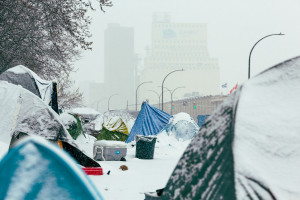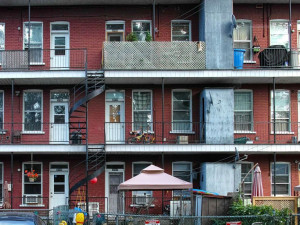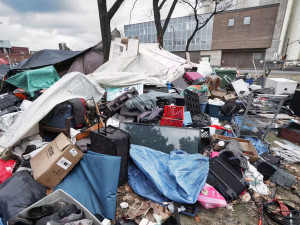
Quebec should enact a right-to-housing law

Concerted action during recent cold snap averted disaster for unhoused people, but long-term solutions are needed.
The recent extreme cold snap, however short-lived, could have been disastrous for city’s growing population of unhoused people. The opposite happened. The community and governmental sectors worked together seamlessly to protect our city’s most vulnerable people from this severe weather event. Non-profit organizations allowed residents to stay in their facilities for longer hours. The City of Montreal and local Montreal health agency, the CIUSSS Centre-Sud, opened up 100 additional spaces to provide overnight accommodations to people with no other place to turn. Even hospital ERs were on call to not discharge unhoused patients into the cold weather. Everything worked last weekend.
In the last two years, people died in our streets. Raphael André, Elisapie Pootoogook, and Stella Stosik perished tragically in different parts of downtown Montreal during the winters of 2021 and 2022.
It hasn’t happened this year as a result of the collaborative efforts of every player involved in the fight against homelessness. It is heartening to see what can be accomplished when everyone is pitching in, when it’s a matter of life and death.
That’s the good news. The sobering news is that the fight against homelessness rages on.
The collective effort to reverse the upward trend in homelessness is ongoing because there aren’t enough affordable, suitable housing units in Montreal. The tents and encampments that are springing up in many Canadian cities, including Montreal, are emblematic of a collective failure to implement long-term solutions.
In this regard, a recent judgment by Ontario Superior Court Justice Michael Valente is highly relevant. The court found that the Waterloo region could not legally evict the people living in a large encampment in downtown Kitchener because local shelters did not have room for everyone. The justice also cited several decisions delivered in British Columbia that established a constitutional right to shelter when the number of unhoused people exceeds the number of accessible spaces in that jurisdiction.While it is unclear whether a judgment of a similar kind would equally restrain the City of Montreal if brought before the Quebec courts, what is clear is that creating “a right to encampment” because of a lack of sufficient and appropriate shelter spaces is a far cry from enacting a right to adequate housing for all.
The federal government has created a progressive right to housing in the National Housing Strategy Act. The Quebec Homelessness Prevention Policy Collaborative has called on the Quebec government to enact a Quebec version of the right to housing to mirror the federal legislation. The right to housing legislation has been shown to promise dramatic decreases in homelessness. Legislating a right to housing in Quebec may help us to avoid ever having to go through another weekend like the last one.
Dernières nouvelles
-
 James Hughes, President and CEO of the Old Brewery Mission, receives the National Assembly Medal of Honour
James Hughes, President and CEO of the Old Brewery Mission, receives the National Assembly Medal of Honour -
 Meet Mariane Dupuis, psychosocial counsellor for the PRISM program
Meet Mariane Dupuis, psychosocial counsellor for the PRISM program -
 Will a 5.9% rent hike lead to more economic homelessness?
Will a 5.9% rent hike lead to more economic homelessness? -
 Homelessness in Montreal: Dismantling encampments isn’t the solution
Homelessness in Montreal: Dismantling encampments isn’t the solution -
 Meet Desmond Olsthoorn, Director of Emergency and Proximity Services
Meet Desmond Olsthoorn, Director of Emergency and Proximity Services - See all news